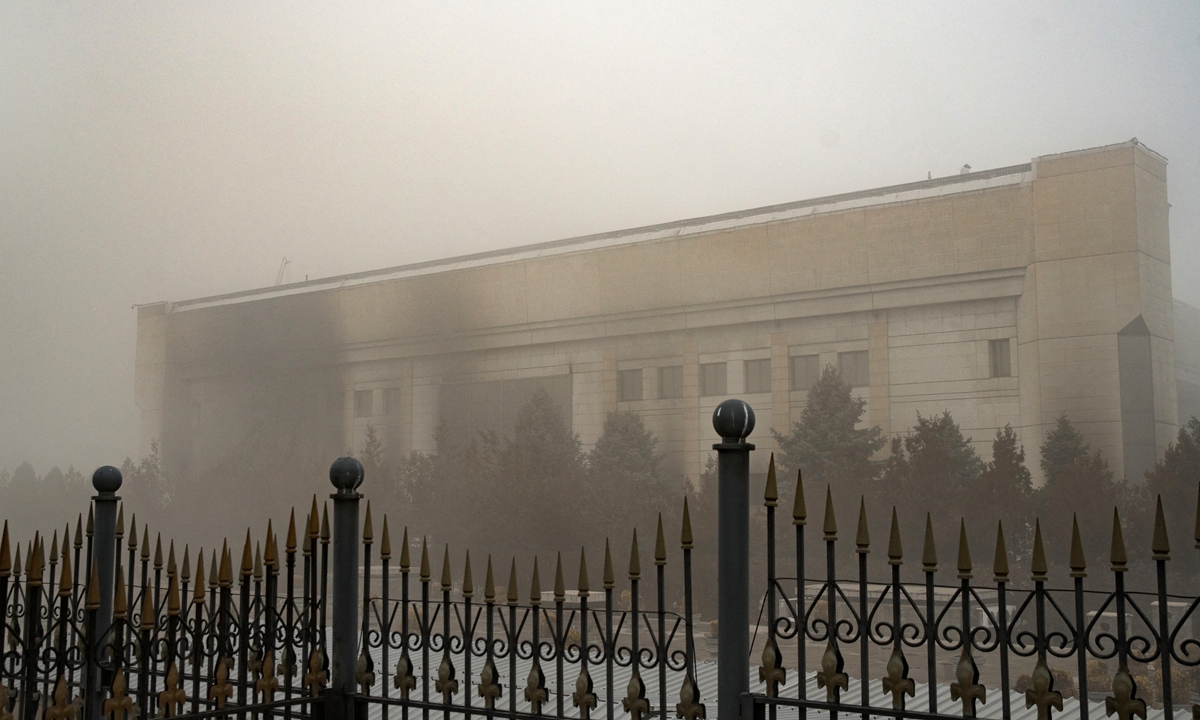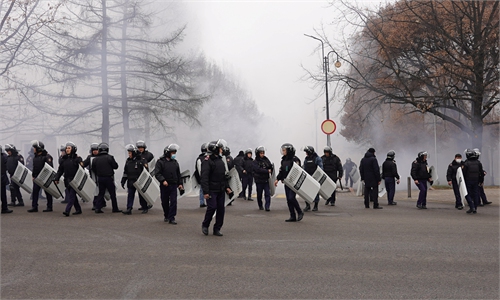
A burned-out administrative building is seen behind a fence in central Almaty on January 6, 2022.Photo: AFP
Due to the hike of fuel prices, demonstrations broke out and then escalated into violent protests in cities including Almaty in Kazakhstan on Wednesday. The situation quickly spiraled. Some analysts said there was a smack of a "Color Revolution" behind the violent protests. Nonetheless, given the currently limited information we can get, the incident is more of an occasional one, and the situation will eventually stabilize.Kazakhstan has developed steadily in the past three decades. It is one of the most developed countries among post-Soviet states, with a per capita GDP of more than $9,000 in 2020. However, due to the COVID-19 pandemic in the past two years, middle-class and grassroots life has suffered changes. Income has plummeted and fuel prices have thus become a spark.
Some media say the US was behind the violence, and the White House has denied the claims. By any means, though, if there is some force behind the demonstrations, the force that is strong enough to incite such nationwide turmoil, it's likely to be the West or the US. The reason is simple, Kazakhstan is a large country located in Central Asia, and it is important to the region's geopolitical security.
Kazakhstan is also an important economy, an agricultural producer and a country rich in oil and gas. It serves as key transit route for oil and gas. All of these factors determine the importance and particularity of this country. The stability of Kazakhstan's situation directly affects the Central Asian region, including the security of central and southern Russia and the security of China's western region. Even the future situation in Afghanistan may be affected. If political turmoil occurs in Kazakhstan, it is not conducive to regional security, so all parties concerned will work together to help the country maintain stability. Generally speaking, Kazakhstan will not become a so-called source of turbulence. First, among its most important neighboring countries, the two major powers - China and Russia - will definitely support its stable geo-security environment, and so will other members of the Shanghai Cooperation Organisation. Those brotherly countries surrounding Kazakhstan also want to avoid the possibility that chaos will continue in the country.
Due to the governance of former president Nursultan Nazarbayev and incumbent President Kassym-Jomart Tokayev, Kazakhstan is relatively united internally. Since they have some influence on the elites in society, if people remain united, then the anti-government forces in Kazakhstan will unlikely grow stronger.
Third, economically, President Tokayev has already responded and dealt with the issue of the soaring fuel price. It's assumed that he will also entrust the new government to strengthen the economic care for the demands of the people and appease them. With the surging international energy prices, Kazakhstan's economy will be in good shape, which is important for the government to maintain social stability.
At the request of Tokayev, the Security Council of the Collective Security Treaty Organization has decided to send peacekeeping forces to Kazakhstan for restoring stability and security in the country for a specified period of time, in view of the current situation of its sovereign stability and national security, as well as interference from outside.
Russia and Kazakhstan, both important members of the Eurasian Economic Union, maintain a special security partnership. From this perspective, Kazakhstan's security is a major interest concern for Russia. Potential interference in Kazakhstan's internal affairs from outside would trigger greater Russian moves to reduce geo-security risks in Central Asia, in addition to possibly further pushing the Central Asian country toward Russia.
The article is compiled based on an interview with Zhang Hong, an Eastern European studies expert from the Chinese Academy of Social Sciences. opinion@globaltimes.com.cn

